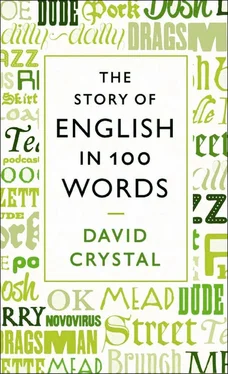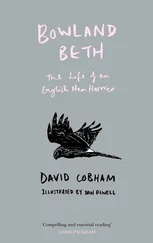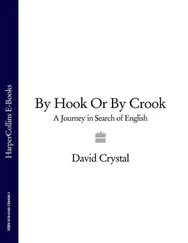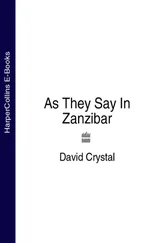Poetic diction is an important element in the history of vocabulary, but it isn’t as popular now as it once was. Today the language of the streets provides most of the lexicon of poetry. We won’t find many modern poets using such words as swain . But Modern English does retain a couple of echoes of the early ‘dogsbody’ meaning of the word, in an unexpected place — the world of boats. The original pronunciation has been lost, but the old word is there in the spelling of boatswain and coxswain .
 17. Pork — an elegant word (13th century)
17. Pork — an elegant word (13th century)
Why does foie gras sound so much more palatable than goose liver , or boeuf bourguignon more romantic than beef stew ? The tradition of preferring French words to English ones in menus has a history which dates from the Middle Ages. The Anglo-Saxons would have eaten sheep , pig , cow and calf ; but these words were evidently too crude to satisfy the fastidious manners of the newly arrived French court.
During the early Middle English period, a new set of words became established as the gourmet’s norm. People now ate mutton , pork, beef and veal . The recipe books of the period are full of French words. Here is the beginning of one of them — a 14th-century recipe for fig tartlets. The French words are underlined:
Tourteletes in fryture . Take figus & grynde hem smal; do þerin saffron & powdur fort . Close hem in foyles of dowe, & frye hem in oyle .
Tartlets in fritter (batter). Take figs and grind them small; put therein saffron and strong powder (spice). Wrap them in foils (layers) of dough and fry them in oil.
You wouldn’t get far in the kitchen without French. The only cookery words that are Old English are grind and dough .
Although pork started out within the language of elegant cuisine, its subsequent history was less salubrious. Already in the Middle English period the adjective porkish was being used as a rude description of fat (‘piglike’) people. An obese or greedy person might be called a porkling . Porky came later, in the 18th century, for anything or anyone resembling a pig, and it became the normal insult for someone noticeably overweight. Warner Bros reclaimed the phrase somewhat when the stuttering cartoon character Porky Pig was introduced in the Looney Tunes series in the 1930s. But the general trend was in the opposite direction. Pork continued to pick up negative associations.
In the 20th century, the process continued when Cockney rhyming slang made pork pie a substitute for lie . Porky pie was used in the same way, and by the 1980s this had been shortened to porky . ‘Don’t tell such porkies,’ someone might say. It is a euphemism, humorously softening the force of lie .
But the ultimate fall from grace came when pork began to be used for the penis in American slang of the 1930s. How did that change come about? The origin seems to lie in the 17th century. The implements used by pig slaughtermen were colloquially called pigstickers , and this term soon became slang for any kind of sharp implement, especially when used as a weapon. The association with pigs led to porker becoming a slang term for a sword. And the obvious parallels in shape and language (such as sword thrusts ) led to both pork and pork sword being used for the male appendage. The French courtiers would have been horrified.
 18. Chattels — a legal word (13th century)
18. Chattels — a legal word (13th century)
It must have been quite hard, being a lawyer in the Middle Ages in England. Originally, all your law books would have been in Latin. Then, in the 13th century, they start being written in French. Then along comes English. Lawyers had a problem. When they wanted to talk about a legal issue, which words should they use? Should they describe the issue using an English word or opt for the equivalent word in French or Latin? And would the words be equivalent anyway? There might be subtle differences of meaning between an English word and a French one which could make all the difference in a court of law.
How to choose? If someone decided to leave all his property and possessions to a relative, should the legal document talk about his goods , using the Old English word, or his chattels , using the Old French word? The lawyers thought up an ingenious solution. They would use both. If the document said goods and chattels , they would be covered against all eventualities. So that’s what they did. And the phrase goods and chattels is still used in legal English.
A large number of legal doublets were created in this way, and some of them became so widely known that they entered everyday English. Every time we say fit and proper or wrack and ruin we are recalling a legal mix of English and French. Peace and quiet combines French and Latin. Will and testament combines English and Latin.
The pattern caught on. After a while, lawyers began to bring together pairs of words from the same language. To avoid a dispute over whether cease meant the same as desist (both words are from French), they simply said that someone should cease and desist . That’s also why we talk about a situation being null and void or someone being aided and abetted . English words were combined too — hence have and hold , each and every and let or hindrance . Lawyers sometimes went in for even longer sequences, such as give, devise and bequeath . This is one of the reasons legal English seems so wordy. (Another is that lawyers were often paid by the word.)
Chattels has some interesting linguistic relatives. The French word is a development from Latin capitalis , and this has given us the word capital . It has, less obviously, given us cattle . Today we think of cattle as cows, bulls, calves and other bovine animals. But until the 16th century it had a much more general sense. Any group of live animals held as property, or farmed for food or produce, could be called cattle . So we find the word being used for horses, sheep, goats, pigs, fowls (‘feathered cattle’) and even camels. ‘Take heed,’ says a writer in 1589, ‘thine own cattle sting thee not.’ He was talking about bees.
 19. Dame — a form of address (13th century)
19. Dame — a form of address (13th century)
People are very sensitive about how others address them. The reason is that there are several choices, and each choice carries a nuance. We could guess a great deal about the relationship between the parties if we heard:
Hello, Mrs Jones
Hello, Jane
Hello, Janey
Hello, Mrs J
Hello, chick
Hello, Didi
Very few people know that Jane was called Didi by her family when she was little.
Our preference for using — or not using — titles can alter over quite short periods of time. Young people these days are much readier to use first names on initial acquaintance than are their seniors, and don’t so often get irritated when a cold-caller greets them over the phone with a breezy intimacy. It’s hardly surprising, then, to find that the use of titles has changed over the course of centuries. But few have had such a chequered history as Dame .
Читать дальше

 17. Pork — an elegant word (13th century)
17. Pork — an elegant word (13th century) 18. Chattels — a legal word (13th century)
18. Chattels — a legal word (13th century) 19. Dame — a form of address (13th century)
19. Dame — a form of address (13th century)










